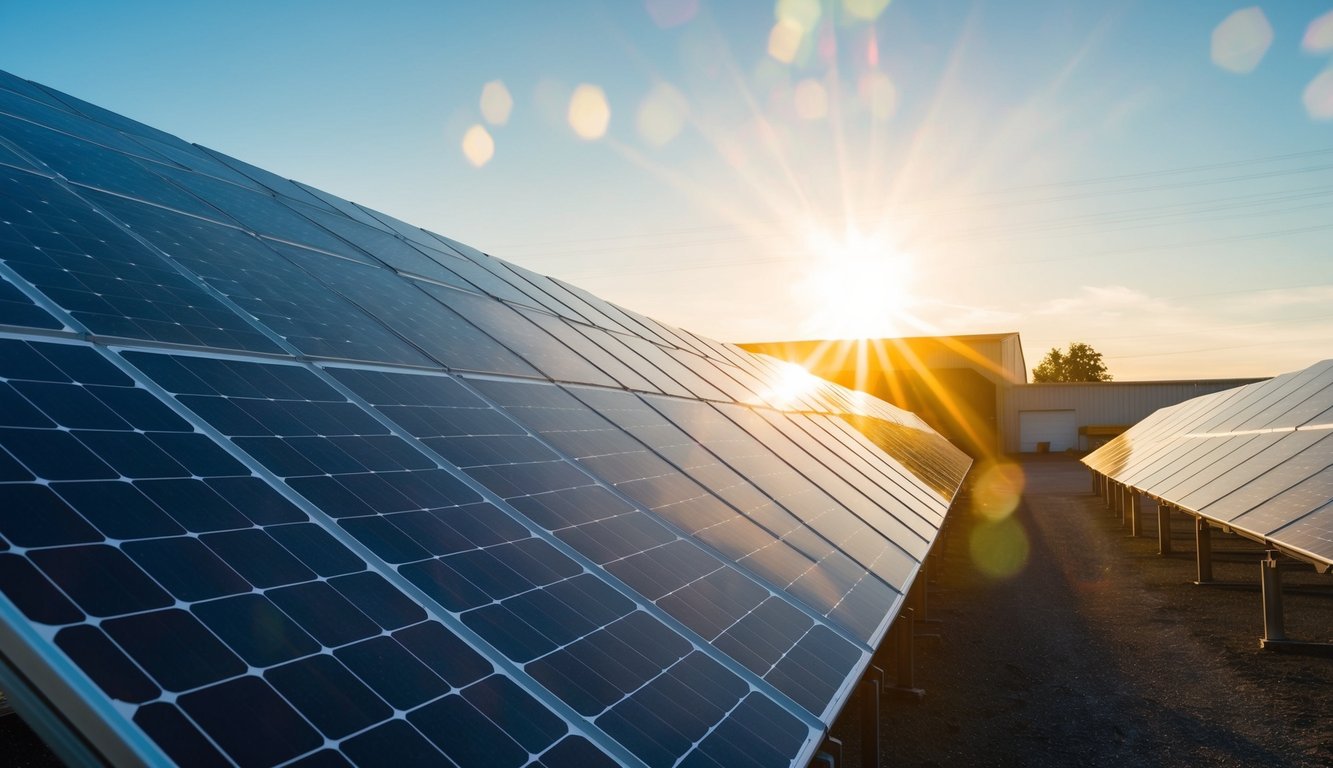Solar Panels Wholesale & Retail: Cost-Effective Energy Solutions for 2025
Solar panels offer substantial benefits for wholesale and retail businesses. These systems can significantly reduce energy costs and provide long-term financial advantages for companies operating in the commercial sector. Solar PV installations enable retailers and wholesalers to lower their carbon footprint whilst gaining more control over their energy expenses.
UK suppliers offer a range of solar products tailored to meet the needs of wholesale and retail operations. From high-quality PV panels to inverters and mounting systems, businesses can access comprehensive solar solutions. Many providers also offer design services and UK-wide delivery to simplify the procurement process.
Implementing solar technology in retail and wholesale facilities addresses the sector’s unique energy requirements. With extended operating hours and high electricity consumption, these businesses are well-positioned to benefit from renewable energy. Solar panels paired with battery storage can help manage peak demand periods and provide a reliable power source.
Key Takeaways
- Solar panels reduce energy costs and carbon emissions for wholesale and retail businesses
- UK suppliers offer comprehensive solar solutions with design services and nationwide delivery
- Battery storage systems complement solar installations to manage peak energy demands
Understanding Solar Panel Distribution Channels
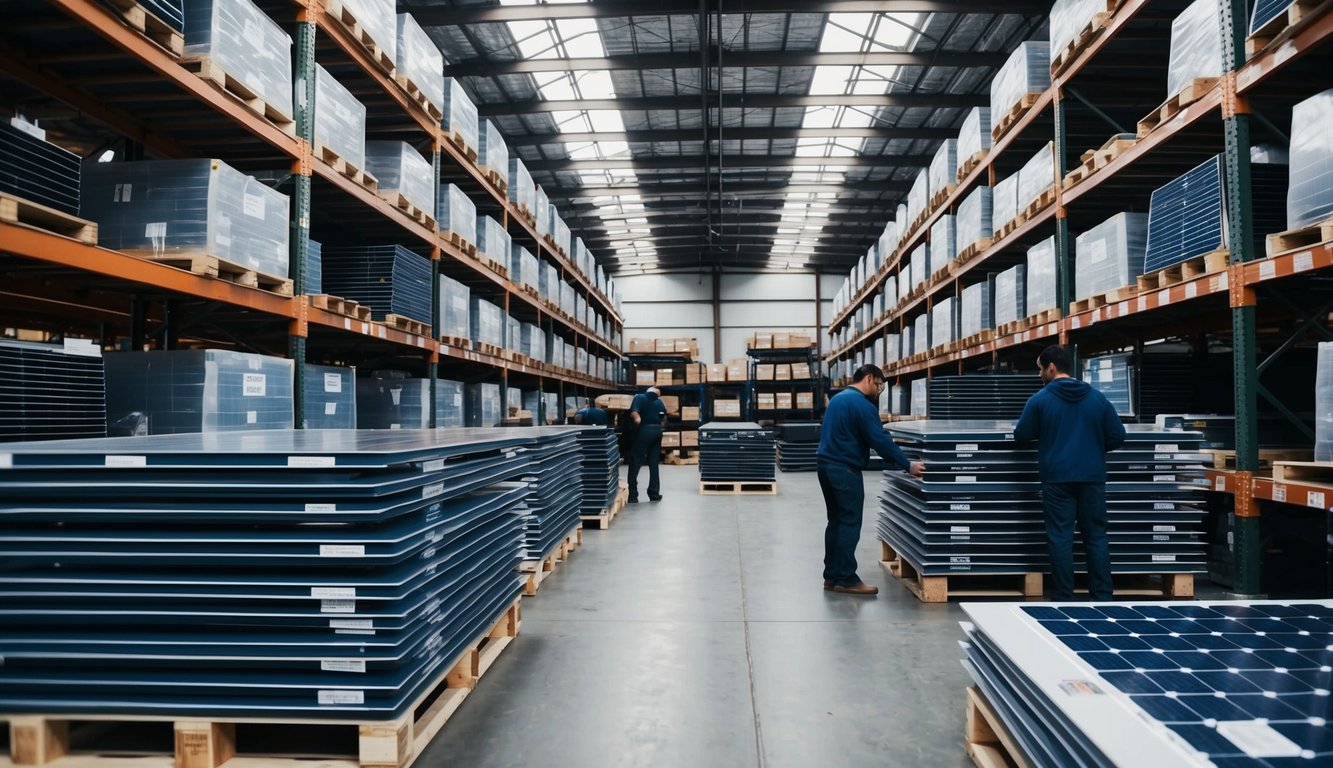
Solar panel distribution involves complex networks and processes to move products from manufacturers to end-users. These channels play a crucial role in the solar industry’s growth and accessibility.
Wholesale vs Retail Markets
Wholesalers purchase large quantities of solar panels directly from manufacturers at discounted rates. They then sell these panels to retailers, installers, or other businesses in smaller quantities. Wholesale markets often require minimum order quantities and offer bulk pricing.
Retail markets, in contrast, cater to individual consumers and small businesses. Retailers buy from wholesalers or distributors and sell panels at higher prices to cover overhead costs and generate profit. They typically offer installation services and customer support.
Wholesalers benefit from lower per-unit costs but face challenges in inventory management and storage. Retailers enjoy higher profit margins but must manage customer relations and compete in a crowded market.
Supply Chain Dynamics
The solar panel supply chain involves several stages:
- Manufacturing: Producers create panels and components.
- Distribution: Wholesalers and distributors move products.
- Retail: Shops and installers sell to end-users.
- Installation: Certified professionals set up systems.
Efficient supply chains reduce costs and improve product availability. Challenges include:
• Logistics: Coordinating transport and storage
• Quality control: Ensuring product consistency
• Inventory management: Balancing stock levels
• Market fluctuations: Adapting to demand changes
Successful distributors maintain strong relationships with suppliers and customers while optimising their operations.
Key Market Players
The solar panel distribution market includes various important actors:
- Manufacturers: Produce panels and components.
- Wholesalers: Buy in bulk and sell to businesses.
- Distributors: Act as intermediaries between wholesalers and retailers.
- Retailers: Sell directly to consumers and small businesses.
- Installers: Purchase panels and provide installation services.
Each player has a unique role in the distribution process. Manufacturers focus on production and innovation. Wholesalers and distributors manage logistics and inventory. Retailers and installers interact directly with end-users, providing advice and support.
Successful market players often specialise in specific regions or product types. They may also offer value-added services like system design or financing to differentiate themselves in a competitive market.
Wholesale Solar Panel Business
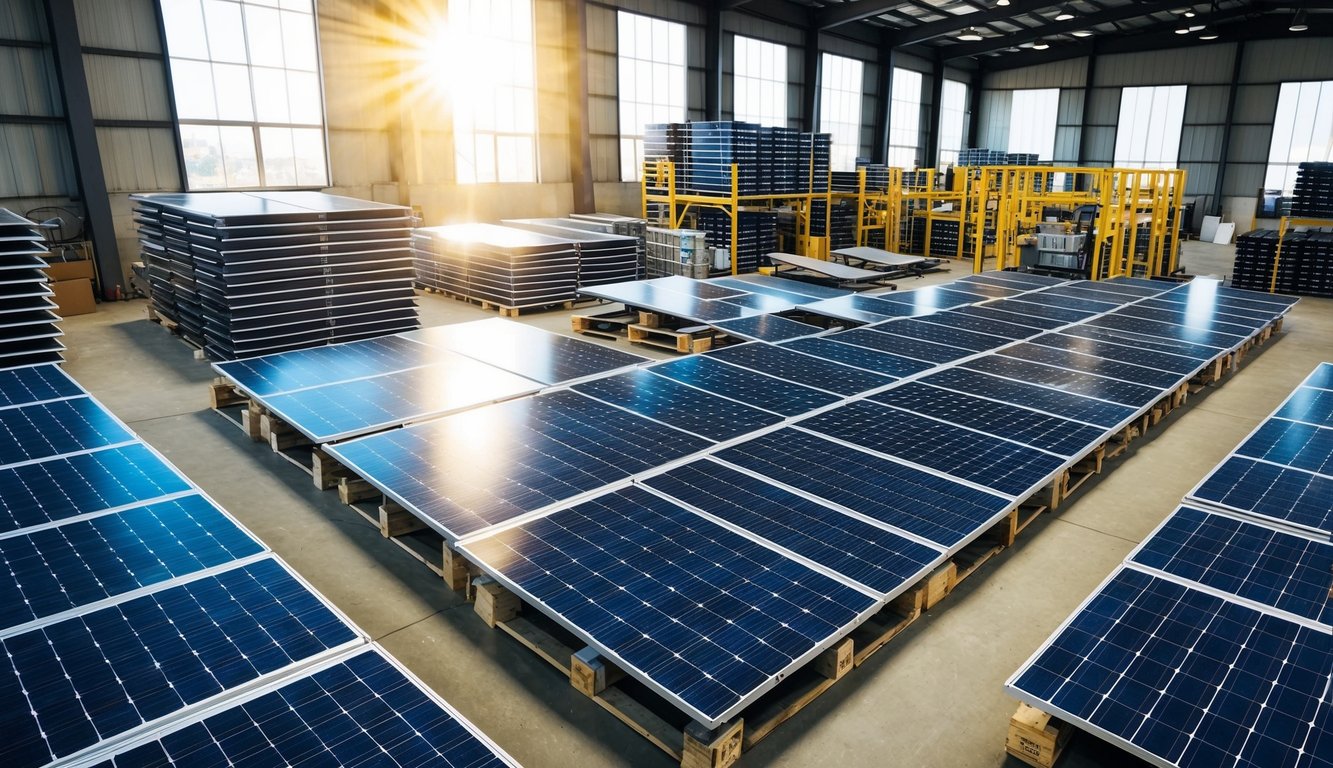
Wholesale solar panel businesses play a crucial role in the renewable energy supply chain. These enterprises procure large quantities of solar panels and related components, then distribute them to retailers, installers, and other industry professionals.
Bulk Purchasing Benefits
Wholesale solar panel businesses enjoy significant advantages from bulk purchasing. By ordering large quantities, they secure lower per-unit costs from manufacturers. This price reduction allows wholesalers to offer competitive rates to their customers whilst maintaining healthy profit margins.
Bulk buying also ensures a steady supply of products, reducing the risk of stockouts. Wholesalers can negotiate better terms with suppliers, such as extended payment periods or priority shipping. These benefits translate to improved cash flow and operational efficiency.
Additionally, bulk purchases often grant access to a wider range of products. Wholesalers can offer diverse selections to meet varying customer needs, from high-efficiency panels to more budget-friendly options.
Pricing Strategies
Effective pricing strategies are essential for wholesale solar panel businesses to remain competitive and profitable. A common approach is cost-plus pricing, where a fixed percentage is added to the purchase cost to determine the selling price.
Some wholesalers employ tiered pricing structures, offering discounts for larger orders to incentivise bulk purchases. This strategy can help increase sales volume and customer loyalty.
Dynamic pricing is another tactic, where prices are adjusted based on market demand, competitor activity, and inventory levels. This flexible approach allows wholesalers to maximise profits during peak demand periods and clear stock during slower times.
| Pricing Strategy | Description | Benefits |
|---|---|---|
| Cost-plus | Fixed markup on purchase price | Simple, consistent margins |
| Tiered | Discounts for larger orders | Encourages bulk buying |
| Dynamic | Prices adjust with market conditions | Maximises profitability |
Minimum Order Requirements
Wholesale solar panel businesses typically set minimum order quantities (MOQs) to ensure operational efficiency and profitability. MOQs help cover handling and shipping costs, making each transaction worthwhile.
Setting appropriate MOQs requires balancing several factors:
- Operational costs: Higher MOQs can reduce per-unit handling expenses.
- Customer base: Smaller installers may struggle with high MOQs, while larger clients can easily meet them.
- Product type: More expensive or specialised panels may have lower MOQs than standard models.
Wholesalers might offer mixed MOQs, allowing customers to combine different product types to reach the minimum order value. This flexibility can attract a broader range of clients whilst maintaining operational efficiency.
Storage and Logistics
Proper storage and logistics are critical for wholesale solar panel businesses. Solar panels require careful handling to prevent damage and maintain their efficiency. Warehouses should be climate-controlled to protect panels from extreme temperatures and humidity.
Efficient inventory management systems are essential to track stock levels, monitor product movement, and forecast demand. Many wholesalers use automated systems to optimise their operations and reduce human error.
Transportation is another crucial aspect. Wholesalers must ensure panels are securely packaged and transported to minimise the risk of damage. Some businesses invest in specialised vehicles or partner with logistics companies experienced in handling fragile goods.
Just-in-time inventory management can help reduce storage costs and improve cash flow. However, this approach requires careful planning and reliable suppliers to avoid stockouts.
Retail Solar Panel Sales
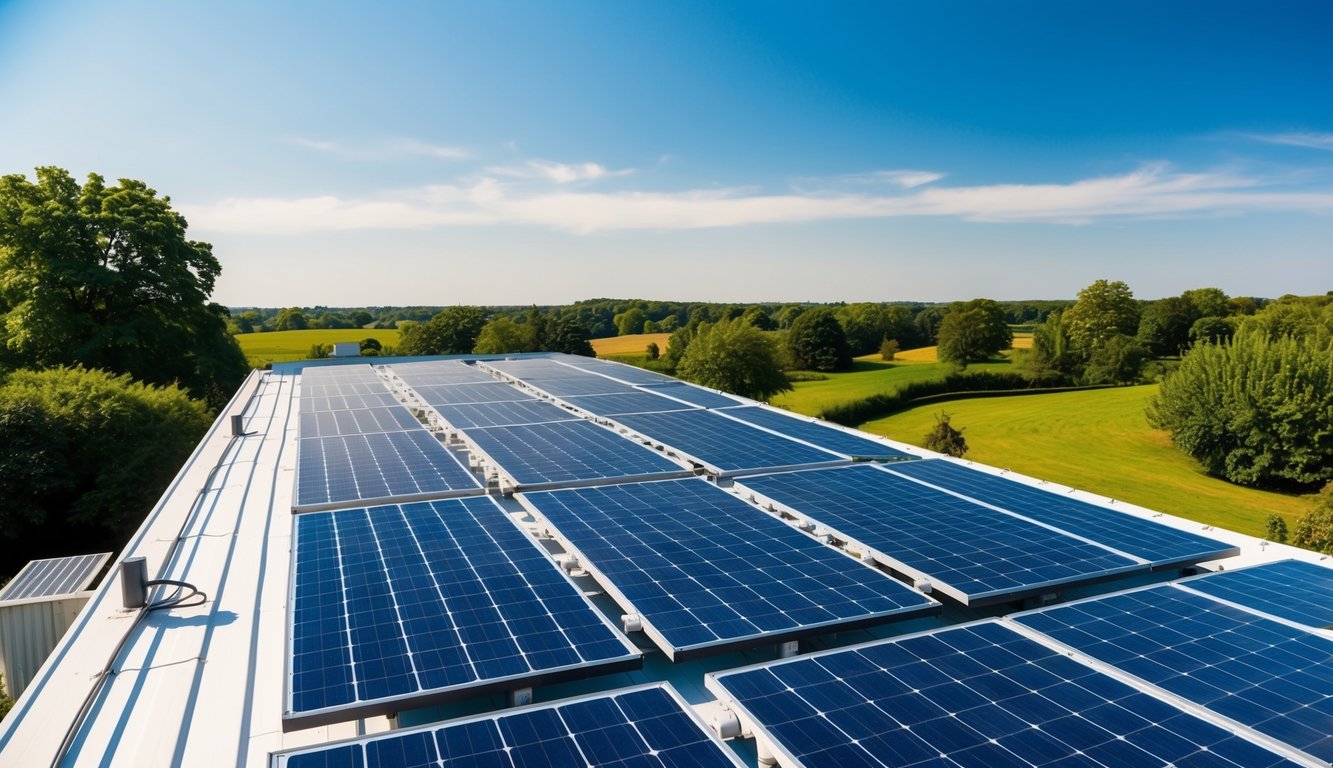
Retail solar panel sales cater to individual consumers seeking to harness renewable energy for their homes. This sector focuses on meeting personal energy needs, providing installation services, and offering warranties to ensure customer satisfaction.
Individual Customer Needs
Retail solar panels address unique requirements of homeowners. You can choose from various panel types, sizes, and efficiencies to suit your property. Monocrystalline panels offer high efficiency in limited spaces, while polycrystalline options provide a cost-effective solution for larger areas.
Factors influencing your choice include:
- Roof size and orientation
- Local climate and shading
- Energy consumption patterns
- Budget constraints
A thorough site assessment helps determine the optimal system for your home. Many retailers offer energy audits to analyse your usage and recommend suitable panel configurations.
Installation Services
Professional installation is crucial for maximising solar panel performance. Reputable retailers provide comprehensive services, including:
- Initial site survey
- System design and planning
- Mounting and electrical connections
- Grid integration and meter setup
Certified installers ensure compliance with local building codes and electrical standards. They handle necessary permits and paperwork, simplifying the process for you.
Quality assurance checks post-installation verify system functionality and safety. Many retailers offer ongoing monitoring services to track your system’s performance and identify potential issues promptly.
Warranty and Support
Robust warranties protect your solar investment. Typical coverage includes:
| Component | Warranty Period |
|---|---|
| Panels | 25-30 years |
| Inverter | 10-12 years |
| Workmanship | 5-10 years |
Performance guarantees often ensure 90% output after 10 years and 80% after 25 years. Responsive customer support is essential for addressing concerns and maintenance needs.
Many retailers offer extended warranties and service plans for added peace of mind. Regular maintenance checks can optimise system efficiency and longevity.
Pricing for Retail Customers
Solar panel costs have decreased significantly, making them more accessible to homeowners. Pricing depends on:
- System size and capacity
- Panel quality and brand
- Installation complexity
- Additional components (batteries, smart meters)
Government incentives and feed-in tariffs can offset initial costs. Many retailers offer financing options, including solar loans and power purchase agreements, to spread payments over time.
Bulk-buy schemes organised by community groups or local councils can reduce costs through collective purchasing power. Some retailers provide price-matching services to ensure competitive rates.
Compare quotes from multiple suppliers to find the best value. Consider long-term savings on electricity bills when evaluating the overall investment.
Comparing Solar Panel Types for Different Markets
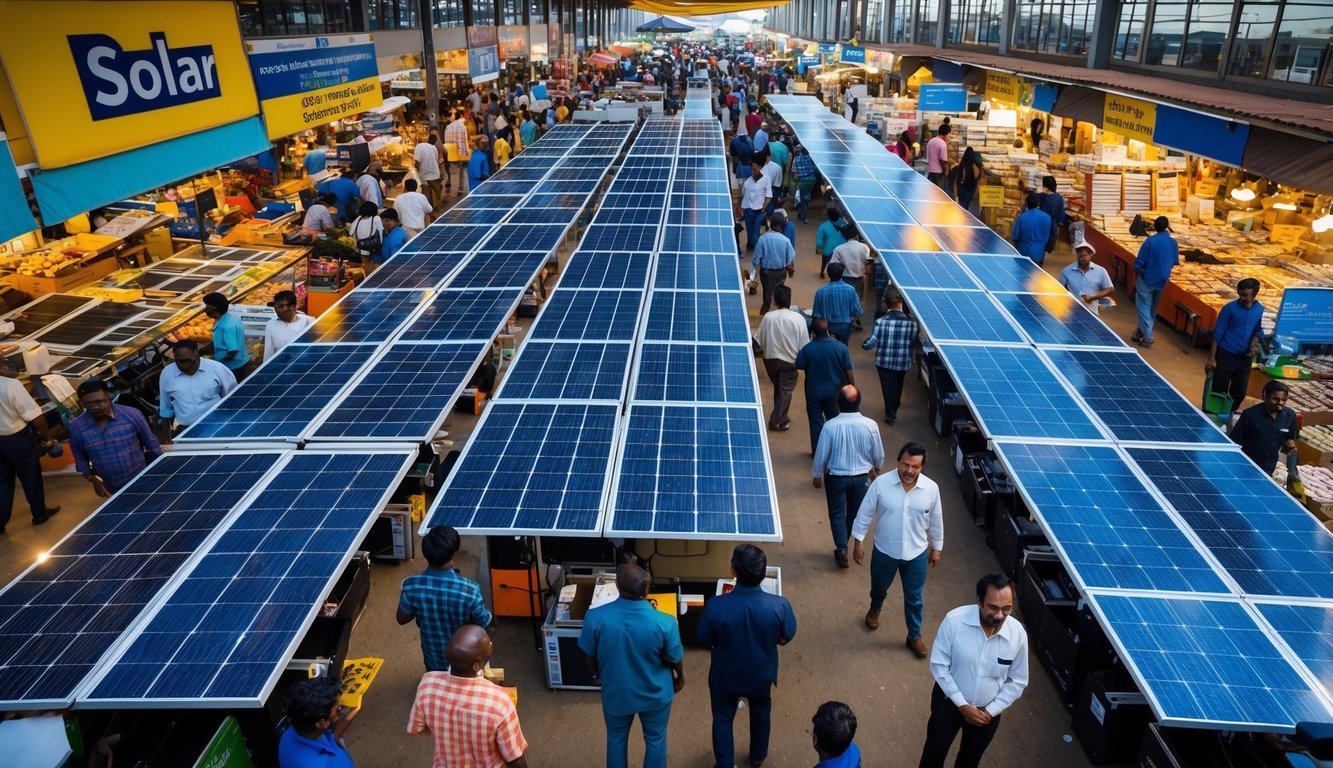
Solar panel selection varies significantly across wholesale and retail markets. Different types offer unique advantages in efficiency, cost, and suitability for various installation scales.
Monocrystalline Panels
Monocrystalline panels are renowned for their high efficiency. They convert sunlight to electricity at rates of 20-22%. These panels are ideal for limited roof space in residential settings.
Wholesale buyers often choose monocrystalline for large-scale solar installations where maximising output is crucial. Their sleek black appearance also makes them popular in the retail market for aesthetically-conscious homeowners.
Monocrystalline panels perform well in high temperatures, making them suitable for hot climates. However, their higher cost can be a deterrent for budget-conscious consumers.
Polycrystalline Panels
Polycrystalline panels offer a cost-effective alternative. Their efficiency ranges from 15-17%, slightly lower than monocrystalline. These panels are popular in both wholesale and retail markets due to their lower price point.
Large-scale solar installations often utilise polycrystalline panels to balance cost and performance. They are particularly suited for projects where space is not a constraint.
Retail customers find polycrystalline panels attractive for their affordability. Their blue speckled appearance can blend well with certain roof types.
Thin-Film Options
Thin-film solar panels are flexible and lightweight. They have lower efficiency, typically 10-12%, but offer unique applications. Wholesale markets use thin-film panels for specialised installations like curved surfaces or portable solar solutions.
These panels perform well in low-light conditions and high temperatures. They’re less affected by shading, making them suitable for areas with partial obstructions.
Retail markets find thin-film panels useful for integration into building materials or as portable power sources. Their lower cost per panel can offset the need for more panels to match the output of crystalline options.
Performance vs Cost Analysis
When comparing panel types, efficiency and cost are key factors. Here’s a brief comparison:
| Panel Type | Efficiency | Relative Cost | Best Use Case |
|---|---|---|---|
| Monocrystalline | 20-22% | High | Limited space, high output needed |
| Polycrystalline | 15-17% | Medium | Balanced cost and performance |
| Thin-Film | 10-12% | Low | Flexible applications, low light |
For wholesale buyers, the choice often depends on the scale of the project and available space. Efficient solar panels are crucial for maximising return on investment in large installations.
Retail customers must balance upfront costs with long-term savings. Monocrystalline panels may have a higher initial price but can provide greater savings over time in energy bills.
Solar panel solutions continue to evolve, with new technologies emerging. Bifacial panels, which capture light from both sides, are gaining traction in both markets for their increased energy yield.
Quality Standards and Certification
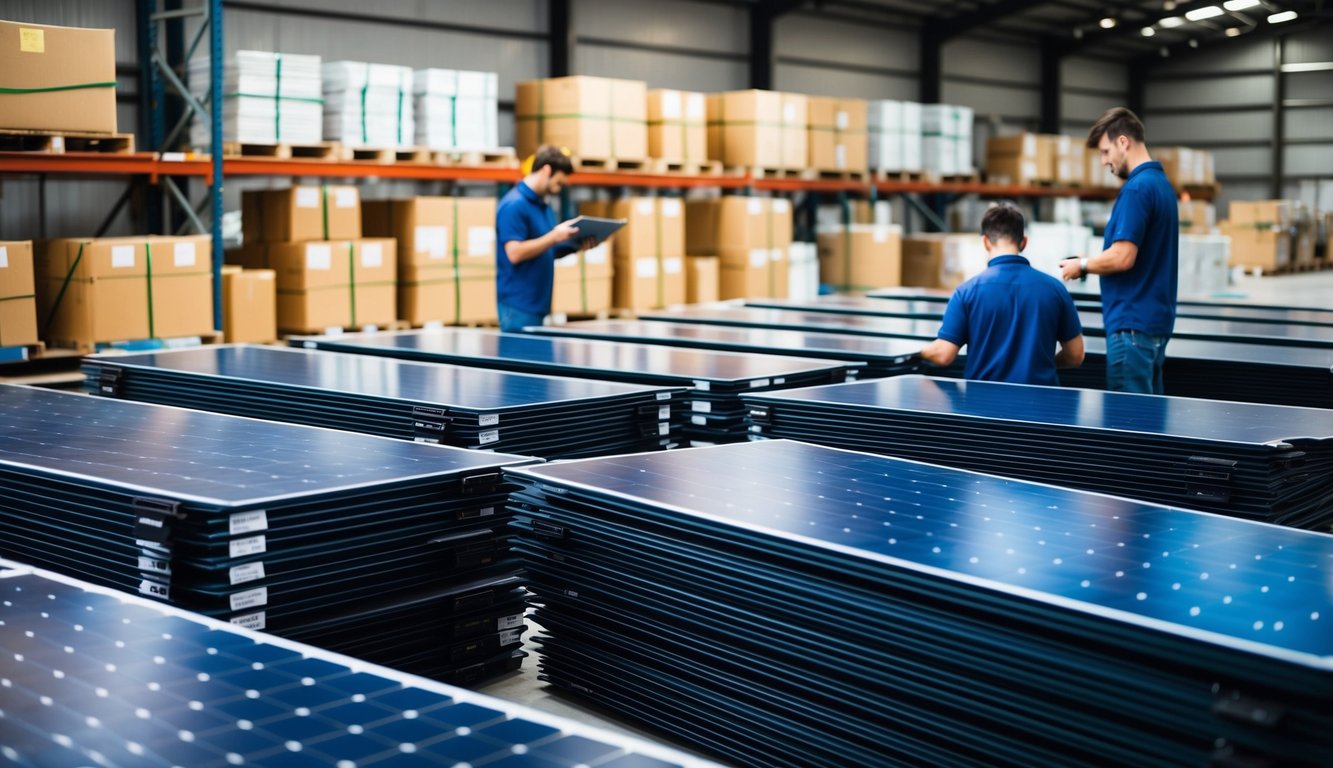
Solar panel quality standards and certifications ensure reliability, safety, and performance. These benchmarks provide crucial assurance for consumers and industry professionals alike.
International Standards
The International Electrotechnical Commission (IEC) sets key global standards for solar panels. IEC 61215 covers crystalline silicon modules, whilst IEC 61646 applies to thin-film technology. These certifications involve rigorous testing for durability and output.
Solar panels must also meet IEC 61730 for electrical safety. This standard assesses fire resistance, electrical insulation, and mechanical strength. Manufacturers seeking global market access typically pursue these certifications.
UL 1703 is another widely recognised standard, particularly in North America. It focuses on fire safety and electrical performance.
Regional Requirements
In the UK, the Microgeneration Certification Scheme (MCS) plays a vital role. MCS certification applies to both solar panels and installers. It ensures products and installations meet high-quality standards.
The European Union mandates CE marking for solar panels sold within its borders. This indicates compliance with EU health, safety, and environmental protection standards.
In the United States, the California Energy Commission (CEC) maintains a list of approved solar modules. Many states reference this list in their regulations.
Testing Procedures
Solar panel testing procedures are comprehensive and exacting. They typically include:
- Environmental testing: Panels undergo temperature cycling, humidity freeze, and damp heat tests.
- Mechanical load tests: Simulate wind and snow loads.
- Electrical performance: Measure power output under standard test conditions.
- Durability checks: Include hail impact and hot spot endurance tests.
Accredited laboratories conduct these tests over several months. They subject panels to extreme conditions to ensure long-term reliability.
Documentation Needed
Manufacturers must provide detailed documentation to obtain certifications. This includes:
| Document Type | Description |
|---|---|
| Technical specifications | Detailed product information, including materials and design |
| Manufacturing process details | Quality control procedures and production methods |
| Test reports | Results from all required testing procedures |
| Safety data sheets | Information on materials used and potential hazards |
Certification bodies review this documentation alongside test results. They may also conduct factory inspections to verify quality control processes.
Installers seeking MCS certification must provide evidence of training and competence. This includes proof of qualifications and ongoing professional development.
Financing and Payment Options
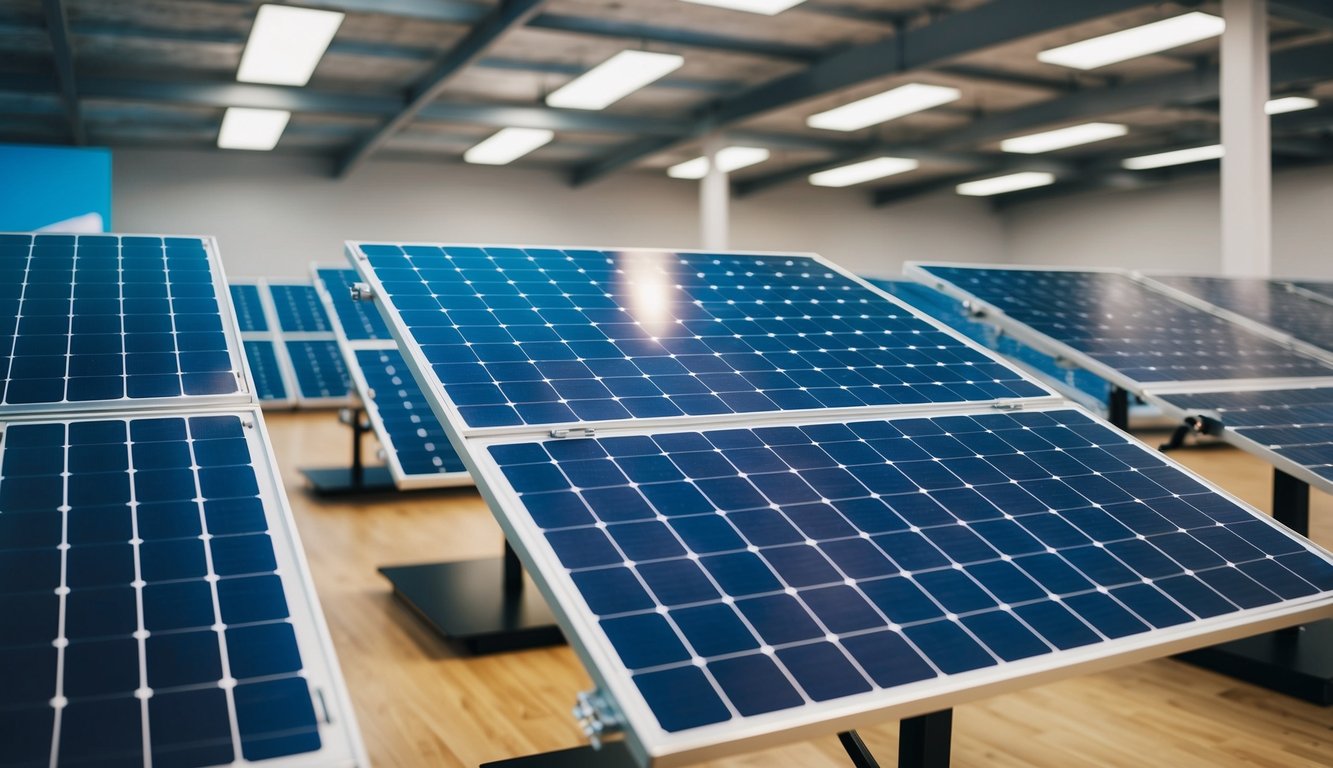
Solar panel installations offer various financial arrangements to suit different needs. Flexible payment structures and incentives make renewable energy systems more accessible for both wholesale and retail customers.
Wholesale Payment Terms
Wholesale solar panel purchases typically involve larger quantities and substantial investments. Payment terms for wholesalers often include:
- Net 30: Payment due within 30 days of delivery
- Letter of Credit: Secures payment for international transactions
- Bulk discounts: Price reductions for high-volume orders
Some suppliers offer extended payment plans for established wholesale clients. These may span 60 to 90 days, allowing buyers to manage cash flow more effectively.
Wholesalers should negotiate terms based on order size and frequency. Regular customers might secure more favourable conditions, such as early payment discounts or consignment arrangements.
Retail Financing Solutions
Retail customers have several options to finance their solar panel systems:
- Monthly payment subscriptions: Fixed instalments over 3 to 10 years
- Solar company financing: In-house payment plans from installers
- Personal loans: Unsecured borrowing from banks or credit unions
- Green mortgages: Home loans that include solar panel costs
Many retailers offer 0% interest periods, typically lasting 12 to 24 months. This allows homeowners to spread costs without additional charges.
Lease agreements are another popular choice. These involve paying a fixed monthly fee for the system, often with little to no upfront cost.
Government Incentives
Government programmes can significantly reduce the cost of solar installations:
- Smart Export Guarantee (SEG): Payments for excess energy fed back to the grid
- Renewable Heat Incentive (RHI): Quarterly payments for generating renewable heat
- Green Homes Grant: Vouchers covering up to two-thirds of installation costs
Local councils may offer additional schemes. These can include grants or low-interest loans for energy-efficient home improvements.
It’s crucial to check eligibility criteria and application deadlines for these incentives. They can change annually, so staying informed is key to maximising benefits.
Tax Benefits
Tax advantages make solar investments more attractive for both businesses and individuals:
- Enhanced Capital Allowances: Write off the full cost of solar equipment against taxable profits
- Reduced VAT: 5% rate on solar panels and installation for residential properties
- Business rates exemption: Solar panels often excluded from property value assessments
Companies can claim capital allowances on solar installations, reducing corporation tax liabilities. This can result in significant savings, especially for large-scale projects.
For homeowners, solar panels may increase property value without raising council tax. This provides a dual benefit of energy savings and potential capital appreciation.
Market Trends and Future Outlook
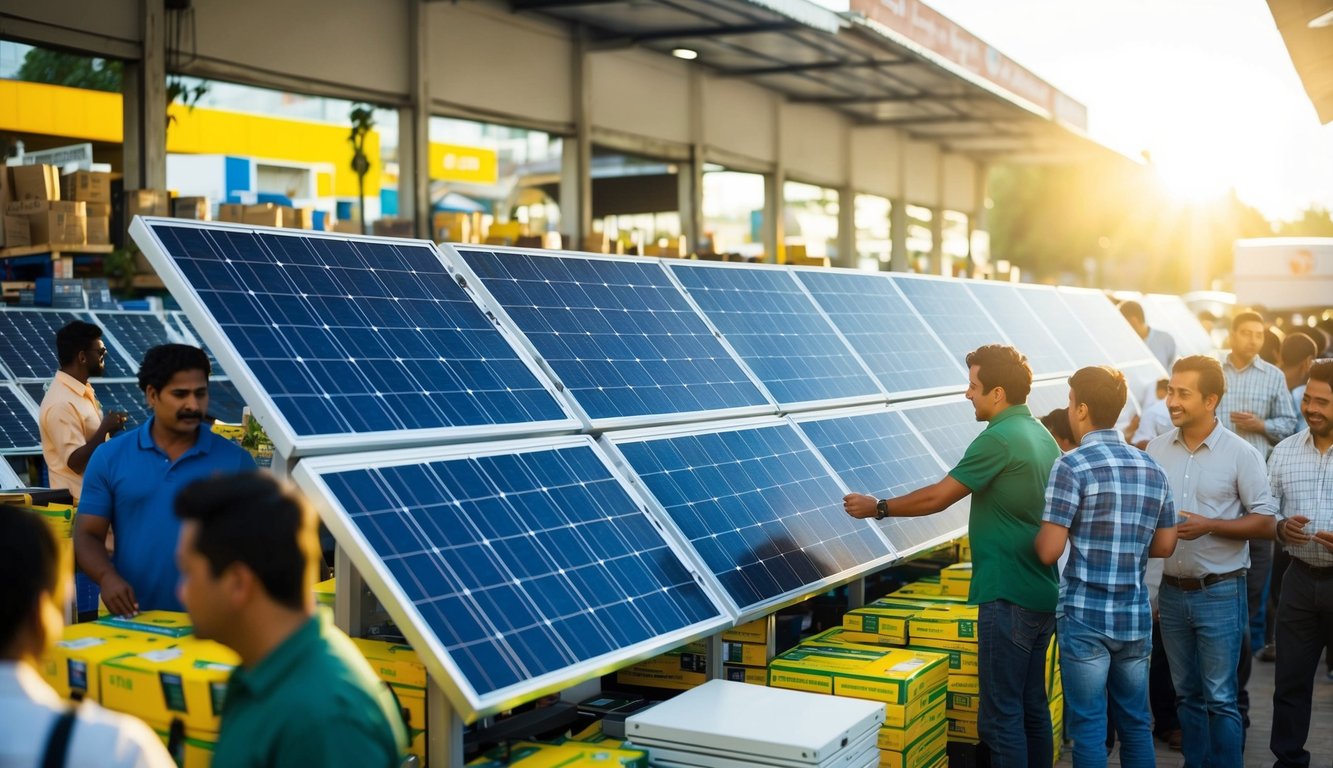
The solar panel industry is poised for significant growth and technological advancements. Emerging innovations, price fluctuations, and sustainability impacts are shaping the future of solar energy.
Emerging Technologies
Solar panel technology continues to evolve rapidly. Perovskite solar cells are gaining traction due to their potential for higher efficiency and lower production costs. These cells can be printed on flexible substrates, opening up new applications. Bifacial panels, which capture sunlight from both sides, are becoming more prevalent, increasing energy yield by up to 30%.
Floating solar farms are emerging as a space-saving solution, particularly in land-scarce regions. These installations can reduce water evaporation and improve panel efficiency through water cooling.
Integrated solar roofing materials are becoming more sophisticated, blending seamlessly with building aesthetics while generating power. This trend is likely to boost residential adoption rates.
Price Predictions
Solar panel prices are expected to continue their downward trajectory. By 2025, analysts forecast a 20-25% reduction in solar module costs compared to 2023 levels. This decline is driven by:
- Improved manufacturing processes
- Economies of scale
- Increased competition among suppliers
Government incentives and policies supporting renewable energy will further reduce the overall cost of solar installations for consumers and businesses.
A potential challenge to this trend is the rising demand for raw materials used in solar panel production, which could temporarily slow price reductions.
Industry Growth Potential
The solar energy market is set for robust expansion. Projections indicate the global market size will reach £219.35 billion by 2025, with a compound annual growth rate of 29.4%.
Key growth drivers include:
- Increasing environmental awareness
- Energy security concerns
- Corporate sustainability goals
- Falling solar technology costs
Residential and commercial sectors are expected to see significant uptake, with utility-scale projects continuing to drive overall market growth.
Emerging markets in Africa and Southeast Asia present substantial opportunities for industry expansion as these regions seek to improve energy access and reduce reliance on fossil fuels.
Sustainability Impact
Solar panels are playing a crucial role in reducing carbon emissions and combating climate change. By 2025, solar energy is projected to offset over 600 million tonnes of CO2 annually.
The industry is focusing on improving the sustainability of panel production and end-of-life management. Initiatives include:
- Reducing water usage in manufacturing
- Developing recyclable panel components
- Implementing take-back programmes for used panels
These efforts aim to create a circular economy within the solar sector, minimising environmental impact throughout the product lifecycle.
As solar adoption increases, grid integration challenges are being addressed through advanced energy storage solutions and smart grid technologies, enhancing the overall sustainability of solar power systems.
Conclusion
Solar panels offer significant advantages for wholesale and retail businesses. You can reduce operational costs, lower carbon emissions, and enhance your property value by investing in this technology. Many retailers have already seen substantial benefits from solar installations.
Implementing solar energy aligns with sustainability goals, making your business more attractive to environmentally conscious customers and potential buyers. The initial investment is often offset by long-term savings on electricity bills.
Key benefits of solar for wholesale and retail:
• Cost reduction: Lower energy expenses
• Sustainability: Reduced carbon footprint
• Property value: Increased building worth
• Energy independence: Less reliance on the grid
• Brand image: Enhanced eco-friendly reputation
As the UK’s retail sector is a major consumer of fossil fuels, solar panels present a practical solution to reduce this dependence. By adopting solar technology, you position your business for a more sustainable and cost-effective future in the evolving energy landscape.
Frequently Asked Questions
Solar panels are an increasingly popular choice for sustainable energy in the UK. Many consumers and businesses have queries about pricing, purchasing, and top suppliers in the market.
What are the average retail prices for solar panels in the UK?
Solar panel prices in the UK vary based on quality, efficiency, and brand. Typically, retail prices range from £4,000 to £6,000 for a 3kW system suitable for an average home. Larger systems for commercial use can cost £15,000 to £30,000 or more.
Prices have decreased significantly over the past decade, making solar energy more accessible. The cost per watt has dropped from around £3-£4 to £1-£2 in recent years.
How can one purchase solar panels directly from the manufacturers in the UK?
Buying directly from manufacturers often requires bulk purchases. Many UK manufacturers sell through authorised distributors or installers. To purchase directly:
- Research UK-based solar panel manufacturers.
- Contact their sales departments to enquire about direct purchases.
- Be prepared to meet minimum order quantities, which can be substantial.
Some manufacturers may offer direct sales for large commercial projects or wholesale buyers.
Which companies are the largest suppliers of solar panels in the UK?
The UK solar market includes both domestic and international suppliers. Major players include:
- Sharp Solar
- Viridian Solar
- GB-Sol
- Solar Century
These companies supply panels for residential, commercial, and utility-scale projects across the UK.
What are the top-rated solar panel brands available in the wholesale market?
Highly regarded brands in the UK wholesale market include:
- LG Solar
- Panasonic
- SunPower
- JinkoSolar
- Canadian Solar
These brands are known for their quality, efficiency, and reliability. They offer a range of panels suitable for various applications and budgets.
How does one locate solar panel wholesalers in proximity to their location?
To find nearby solar panel wholesalers:
- Use online directories specialising in renewable energy suppliers.
- Check with local trade associations or renewable energy groups.
- Attend solar and renewable energy trade shows in your area.
- Search for ‘solar panel wholesalers’ plus your location on search engines.
Many wholesalers operate nationwide, so physical proximity may not be crucial.
Which solar panel manufacturers are considered the best to do business with?
The best manufacturers to work with often combine product quality with excellent customer service. Factors to consider include:
- Warranty terms and after-sales support
- Product range and customisation options
- Delivery reliability and lead times
- Technical support and training
Companies like LG, Panasonic, and SunPower are often praised for their comprehensive support and high-quality products. However, experiences can vary, so it’s wise to research and seek recommendations from other buyers or installers.

